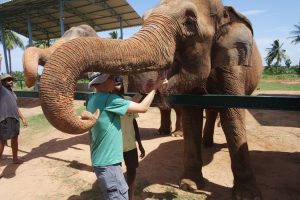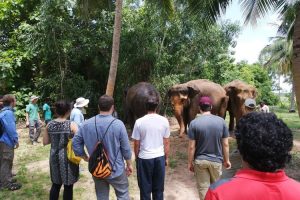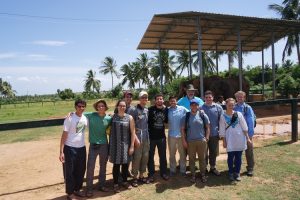
Students in UA’s STEM Path to the MBA program visited India for the second year in a row this past summer. Their mission: provide business solutions to communities in the developing country … and have a little fun along the way.
Rachel Ramey, one of the founding students of the STEM-MBA India program, returned for her second year. She made the trip along with 10 other students and Dr. Rob Morgan, director of the STEM Path to the MBA program. Ramey began working on a project to provide access to clean water during her trip to India last year.
The projects developed in India cover several needs, but access to clean water is a priority in several of the communities the students visited. Ramey, a chemical engineering major, is dedicated to eradicating the water concern. She, along with fellow students Josh Smith and Will Sansoucie, are working to develop a solution.
“[We] focused on the lack of clean drinking water that seemed to contribute to a theme of sickness and hardship present in a lot of our interviews,” Smith said. “We had an idea for a water filter that could be installed in a village, service 200-250 families per day, and provide clean drinking water in areas that currently do not have it.”
The students visited six kinds of communities: a tribal village, farming village, migrant village, developing village, urban slum and a poor neighborhood.

The trip wasn’t all work though. This year, the students also visited an elephant rescue center, Elefriends 101. The center houses three elephants that were rescued from Hindu temples where they were often chained to posts.
“They were very docile because they’ve spent their whole lives in captivity around people so we got to feed and pet them — as much as you can pet a two-ton elephant,” Sansoucie said.
Other students think of it as the icing on the cake to their already incredible experience.
“If there was not already enough evidence to go to India, we also got to feed papaya to Asian elephants,” Ruth Bishop, a student majoring in biology, said. “So you can also love on a real Big Al!”

While the students recognize their own culture shock, Dr. Rob Morgan, the trip’s faculty adviser, can see the students change during the trip with new perspectives.
“The first time they see a family living in a five-foot by six-foot room without electricity and without proper sewage, it has a tremendous impact on them and broadens the way they see the world,” Morgan said.
Bishop said the preconceived notions that many people in the U.S. have about places like India and Tanzania are misplaced.
“From a personal growth standpoint, this is huge. Seeing how people live in other countries and their challenges puts things into perspective and impacts your life’s direction,” Bishop said.
Bishop added that students shouldn’t be afraid to explore and go on a study-abroad trip.
“We can read and study all day long about how to make the world a better place and end poverty, but until we take that initial risk of going to and talking to the people we seek to help, our impact will remain on the drawing board,” Bishop said. “Don’t be afraid to step out of your comfort zone. I promise, you will not regret it.”
